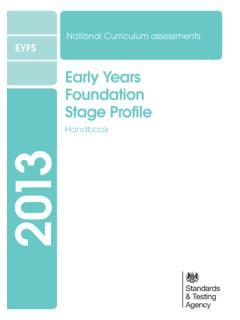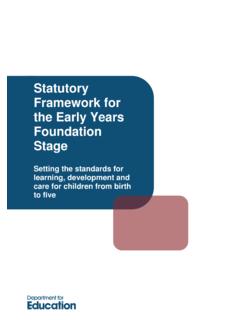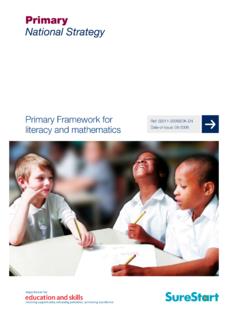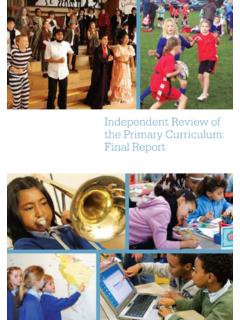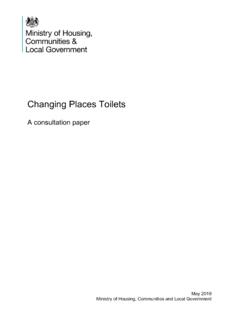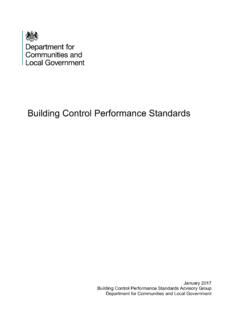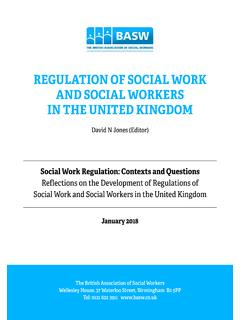Transcription of Meeting Special Educational Needs
1 Excellence for all children Meeting Special Educational Needs Department for Education and Employment Excellence for all children Meeting Special Educational Needs Presented to Parliament by the Secretary of State for Education and Employment by Command of Her Majesty October 1997. CONTENTS. Foreword by the Secretary of State 4. A programme for early 7. By 8. 1 Policies for excellence 11. What are Special Educational Needs ? Early identification and early intervention School improvement and target setting National Curriculum, assessment and qualifications The impact of Information and Communications Technology 2 Working with parents 24.
2 Parents and families Choice Entitlement Partnership 3 Practical support: the framework for SEN provision 31. Code of Practice Improving provision at stages 1-3 of the Code of Practice Statements 4 Increasing inclusion 43. The principle of inclusion Inclusion within mainstream schools Admission arrangements for children with SEN. A new role for Special schools 5 Planning SEN provision 53. Planning: the regional dimension Planning: the school dimension 6 Developing skills 60. The mainstream context Professional development of teachers Initial teacher training and induction Continuing professional development Learning support assistants School governors Educational psychologists 7 Working together 69.
3 Government Co-operation between local agencies 8 Principles into practice: emotional and behavioural difficulties 77. Children with emotional and behavioural difficulties: a strategy for action Improving achievement Early identification and intervention Inclusion: effective behaviour policies Strengthening staff skills Specialist support Disseminating best practice Encouraging fresh approaches in the secondary years Appendix 1 Members of the National advisory Group on SEN 89. Appendix 2 Funding and the SEN framework 91. Appendix 3 Arrangements for consultation 94. Key questions Copies of the Green paper Summary version How to respond to consultation Internet Abbreviations Please note that all statistics quoted for January 1997 are provisional figures derived from the Schools' Census (Form 7).
4 Foreword by the Secretary of State for Education and Employment, the Rt Hon David Blunkett MP. There is nothing more important to the Government than raising the standards children achieve in our schools. The White paper Excellence in schools committed us to exacting targets, and proposed a challenging programme to achieve them. Our vision is of excellence for all. This inclusive vision encompasses children with Special Educational Needs (SEN). Schools currently identify 18% of children as having Special Educational Needs of differing kinds. Almost 3% have individual statements showing the additional Special Educational provision they require.
5 This Green paper asks some questions about these figures. What is not in question is the case for setting our sights high for all these children. Good provision for SEN does not mean a sympathetic acceptance of low achievement. It means a tough-minded determination to show that children with SEN are capable of excellence. Where schools respond in this way, teachers sharpen their ability to set high standards for all pupils. The great majority of children with SEN will, as adults, contribute economically;. all will contribute as members of society. Schools have to prepare all children for these roles.
6 That is a strong reason for educating children with SEN, as far as possible, with their peers. Where all children are included as equal partners in the school community, the benefits are felt by all. That is why we are committed to comprehensive and enforceable civil rights for disabled people. Our aspirations as a nation must be for all our people. Our approach to improving the achievement of children with Special Educational Needs has six themes: 4. our high expectations for all children include high expectations for children with SEN. All our programmes for raising standards will reflect this, starting from pre-school provision, building on the information provided by the new arrangements for baseline assessment when children start in primary school, and leading to improved ways of tackling problems with early literacy and numeracy.
7 While recognising the paramount importance of Meeting the Needs of individual children, and the necessity of specialist provision for some, we shall promote the inclusion of children with SEN within mainstream schooling wherever possible. We shall remove barriers which get in the way of Meeting the Needs of all children and redefine the role of Special schools to develop a network of specialist support. We attach high priority to the development of new regional arrangements for improving the effectiveness of SEN provision;. we want all parents of children with SEN to get effective support from the full range of local services and voluntary agencies, to have a real say in decisions about their child's education, and to be empowered to contribute themselves to their child's development.
8 Some parents need to be helped to gain access to these opportunities;. we want good value for money from the one-seventh of their budget . billion which local education authorities (LEAs) currently spend on Special Educational Needs . This is not about cost-cutting. It is about ensuring that this provision leads to achievement at school, and success in adult life. We want to look at ways of shifting resources from expensive remediation to cost-effective prevention and early intervention; to shift the emphasis from procedures to practical support; and to see whether changes should be made to any aspects of statements of SEN.
9 We shall boost opportunities for staff development in SEN, and see that good practice is widely disseminated, so that the principles of this Green paper can be put into practice;. 5. we know that positive approaches to Special Needs make a difference. We shall work in co-operation with all who share our objective of high standards for children with SEN; and we shall expect provision locally to be based on a partnership of all those with a contribution to make. This Green paper is the first step in a fundamental reappraisal of the way we meet Special Educational Needs . It explains our approach. It challenges some widespread assumptions.
10 Above all, it seeks the views of all those with an interest in Special Educational Needs on how to make a reality of our vision. The paper includes examples to show what is currently being achieved. These are not intended as benchmarks of best practice but to demonstrate good practice on which we can build. We have set up a National advisory Group on SEN, chaired by the Minister responsible for SEN, Estelle Morris MP. This Group, whose membership is listed in Appendix 1, has been influential in the preparation of this Green paper . It will work closely with our Standards Task Force. Members of the Group will play an important part in the arrangements for consultation on the Green paper .
